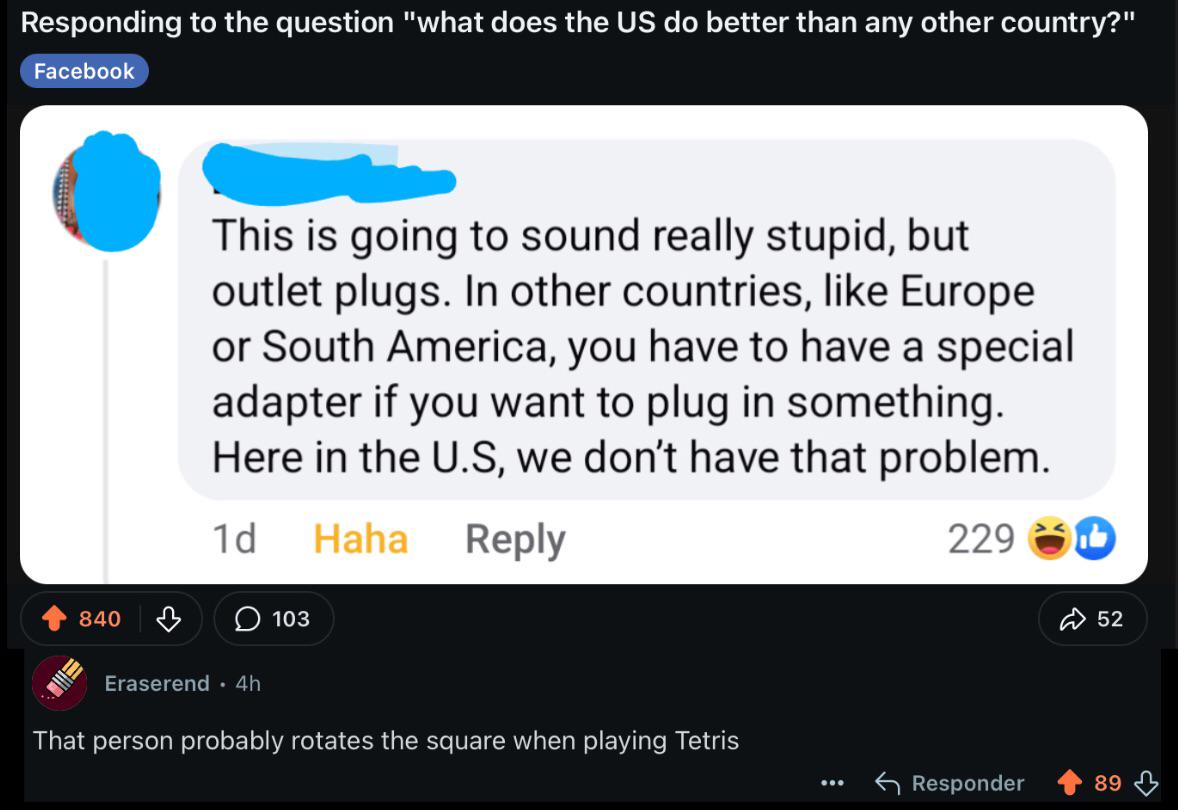this post was submitted on 27 Jun 2025
629 points (98.0% liked)
Rare insults
1557 readers
68 users here now
Post any unique insults you find!
Rules:
- No hateful Insults
- No personal information
- No politics
founded 2 years ago
MODERATORS
you are viewing a single comment's thread
view the rest of the comments
view the rest of the comments

there's so much more to UK plugs, they are on another league compared to other plugs.
All sockets are childproof, the holes have like doors that block the socket unless the earth pin is inserted.
the plug pins are only half exposed, so there's no live surfaces outside of the socket.
there's a fuse in the plug.
no need for 2A in the UK, the plugs can double as a flail.
EU plugs designed in the past 50 years also have half-exposed pins and EU sockets from the past 30 years also have little rubber flaps that only open if they're pressed both at the same time (I've tried it, it works really well, I couldn't get a singular multimeter prong in my outlet until I used the second prong). There are no exposed live conductors anywhere in my house.
Nowadays the main practical difference between EU and UK plugs is the "lack" of a fuse, except any semi-modern appliance that could make use of a fuse should include one internally. In every other situation circuit breakers work fine, UK plugs have fuses because they historically couldn't rely on the circuit breaker existing.
Nowadays the regulatory focus is not on plugs, which are fine, but on GFCI. Gotta put one 30 mA differential per electrical circuit in kitchens/bathrooms and a whole house 300 mA differential. That's a much safer way to detect electrocution than wait until several amps have been going through the plug because all you're getting by the time the fuse trips is a fried person sandwich.
Yeah, I swear Brits love regurgitating that Tom Scott video, even though it is massively hyperbolic and exaggerated and completely ignores that specific British context which made the fuse necessary.
This looks like BS.
US required TR plugs starting in 2008, and it looks like a EU directive in 2001 recommended them but left it up to individual countries and says there’s still no eu-wide mandate. Unless the search ai is lying, US and EU did this at about the same time but US had a larger mandate
Anecdotally I haven't seen a plug in Belgium that didn't have them that also wasn't ancient. Dunno if the RGIE requires it, I can't be arsed to find out, but the risk/reward for manufacturers considering lawsuits probably tips it in favor of safety given how inexpensive the mechanism is.
Also it is worth noting that the plug hole is much smaller on EU outlets than NEMA, and recessed. Even with exposed conductors it would take a determined toddler to find something small enough to reach inside (basically a needle or small screwdriver which they should not be playing with to begin with).
I can see the recessed shape being a nice safety improvement, although I’m used to what I’ve lived with and haven’t killed myself that way yet, so I’d still probably err on the side of convenience, less bulk.
An interesting consequence of the flat faced outlet is so many shapes and sizes of plugs around the same standard prongs, and now I do nt want to do without them
The only disadvantage to UK plugs is that they turn into caltrops when unplugged
US outlets are required to be “tamper resistant” since 2008. Same little doors.
However just like anything else, old installations are grandfathered in - you’re not forced to replace all your outlets.
I actually started replacing all my house’s outlets in 2005, as part of child-proofing. Maybe that’s over-zealous but when I was growing up my younger brother kept shocking himself. Anyway, I quickly ran into misjudging just how big a task it was, how many outlets there are, so focussed on most risky outlets like the kids rooms. Now the kids are in college and I never completed the task - there’s really only a couple years when kids are that stupid